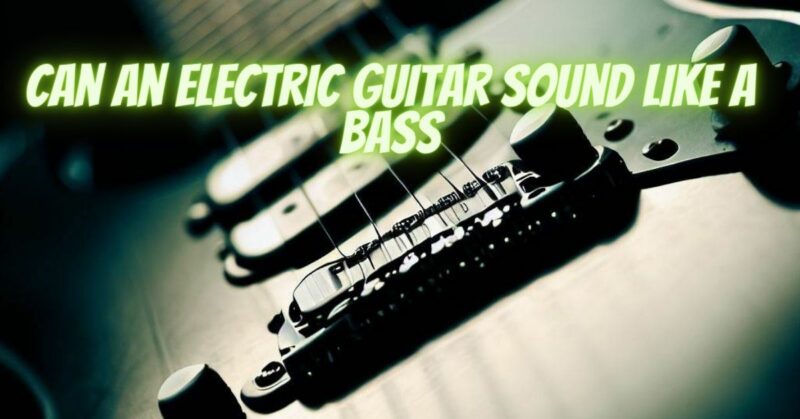Electric guitars and bass guitars are two distinct instruments with different design, string count, and intended roles in a band’s sound. However, with the advent of modern technology and innovative gear, musicians have found ways to emulate the deep and resonant tones of a bass guitar using their electric guitars. In this article, we explore the possibilities of achieving a bass-like sound on an electric guitar and the techniques and tools that make it possible.
The Challenges of Simulating Bass Tones on an Electric Guitar
Electric guitars and bass guitars have fundamental differences that present challenges when trying to replicate the bass sound on a standard six-string electric guitar.
- String Gauge: Bass guitars have thicker strings than electric guitars. The thicker strings contribute to the deeper and fuller bass sound of the instrument. Standard electric guitar strings may lack the required thickness to replicate the low frequencies of a bass guitar.
- Scale Length: Bass guitars typically have a longer scale length than electric guitars, which affects the tension and resonance of the strings. This longer scale contributes to the characteristic low-end richness of the bass sound.
- Pickup Design: Bass guitars often have different types of pickups than electric guitars, optimized for capturing the low frequencies. Traditional electric guitar pickups may not capture the full depth of bass frequencies.
Techniques and Tools for Achieving a Bass-Like Sound
While an electric guitar may not perfectly replicate a bass guitar’s sound, there are several techniques and tools that musicians can use to come close to the low-end tones of a bass:
- Downtuning: Downtuning the electric guitar to lower frequencies can help achieve a deeper and bass-like sound. Tuning down the strings to drop D or even lower can add richness to the tone.
- String Gauges: Using thicker strings on the electric guitar can increase the low-end response, making the instrument sound closer to a bass. Heavier gauge strings can also be used in combination with downtuning.
- Octave Pedals: Octave pedals are popular effects used by guitarists to produce tones one or two octaves below the original pitch. These pedals can create a synthesized bass-like sound when applied to an electric guitar signal.
- Bass Amp Simulators: Some guitar amplifiers or digital effects units come with bass amp simulators, allowing guitarists to emulate the characteristics of a bass amp and speaker setup.
- Double Tracking: Layering the guitar part with another track playing one octave below can create a fuller sound that resembles the depth of a bass guitar.
While an electric guitar may not fully replicate the distinct and powerful sound of a bass guitar, modern technology and creative techniques offer guitarists the means to approximate bass-like tones. Downtuning, using thicker strings, employing octave pedals, bass amp simulators, and double tracking are some of the methods that musicians can utilize to achieve a deeper and more resonant sound on their electric guitars.
Keep in mind that while these techniques can come close to emulating a bass guitar’s sound, there will always be inherent differences between the two instruments. Nonetheless, experimenting with these tools can add a unique dimension to a guitarist’s sonic palette and provide exciting possibilities for musical expression.


